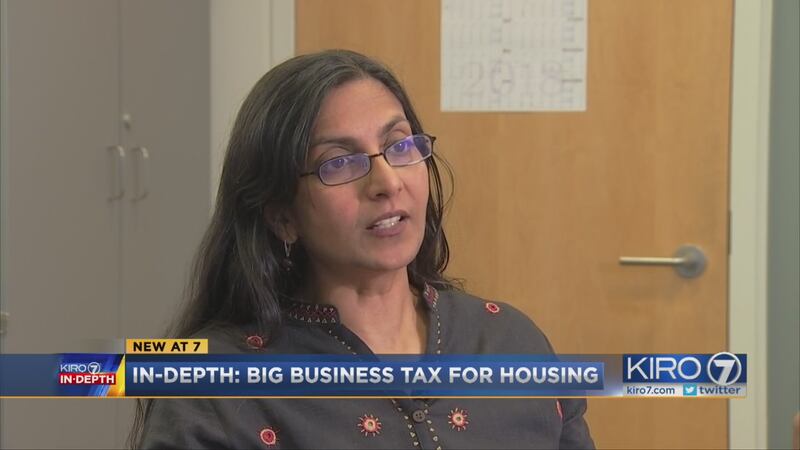Seattle City Councilmember Kshama Sawant is leading a growing grassroots movement she calls "Tax Amazon--Not workers or small business."
Sawant says Amazon specifically is responsible for the escalation of rent and property values in Seattle since they made Seattle their global headquarters in 2010 -- and she correlates the homeless crisis to the disappearance of affordable housing.
"That's why we need to make sure the biggest businesses like Amazon pay at least ... their fair share to make this city affordable and welcoming for everybody," she said.
Sawant wants to tax the top 10 percent of Seattle-based businesses such as Amazon, Starbucks and Nordstrom $150 million based on a per-employee hourly tax. She says the money would allow the city to build 750 affordable-housing units and add $30 million for new homeless services.
She says the tax would not affect small businesses.
"Small businesses are already overburdened," she said. "You have to go to where the real wealth is in Seattle is and that's with the biggest businesses in this city. Can you think of big businesses without thinking of Amazon?"
Jacob Vigdor, University of Washington professor of public policy, was asked to send a letter expressing his expert opinion about the tax proposal to some members of the city council. Vigdor says the plan would lead corporations to reduce staff and wages, so workers will end up being the most affected by the proposed tax.
"The basic message here, is, what you're proposing doesn't accomplish what you want," Vigdor said.
"Research shows that even if you tell a business owner they have to have to write the check that pays this tax, that business owner is always going to turn around and reduce the paychecks of the workers to pay for it," Vigdor said. "So, it ends up being a tax that is paid by the workers. Study after study has documented this."
Last year, several members of the City Council signed a letter with an apologetic tone to Amazon, saying the members want to build a better relationship by hitting a "refresh button."
Sawant says some city leaders will hesitate to vote for an aggressive new tax, and that’s why she's building public demand for it.
"Just to give you an example, Amazon alone threw down $350,000 for (Seattle Mayor) Jenny Durkan's campaign last year," Sawant said. "We cannot expect corporate politicians to fight for our affordable housing, we have to do it ourselves."
Vigdor said the debate will hinge on two difficult questions: If the city can efficiently make an impact on the homeless crisis with $150 million, and if the tax method itself is a good idea, given that it could potentially affect workers by reducing the overall payroll of the corporations.
"A progressive tax is a tax that takes more from the rich than it does from the poor," Vigdor said. "The trouble with the payroll tax is that it doesn't do that, it's actually the opposite of progressive taxing. Actually, the city's best option to do this would be to raise property taxes."
Scroll down to continue reading
More news from KIRO 7
- Man arrested in Washington State after suspicious packages found at D.C. area military bases
- Game tickets good for light rail trips to, from Mariners games
- Father who doesn't know how to swim dies rescuing 3-year-old daughter from pond
- Ferguson to sue Trump administration over Census question about citizenship
- State tsunami map predicts where 60-foot tall wave will hit following simulated 9.0 quake
Cox Media Group








